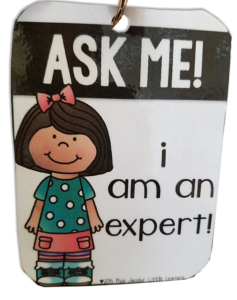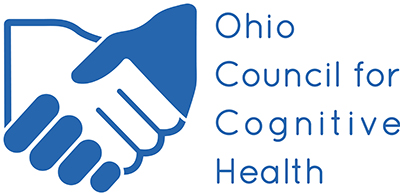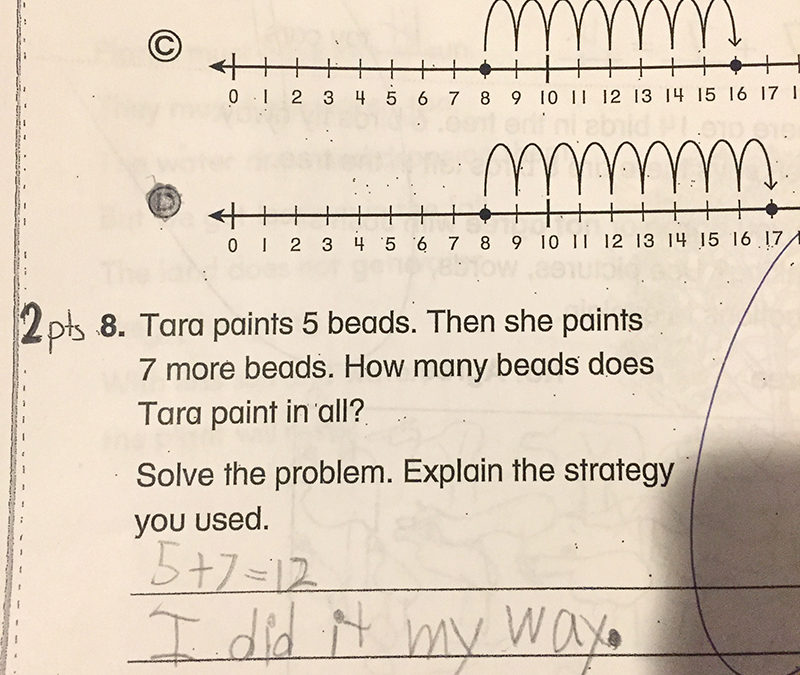Welcome to the web site for The Ohio Council for Cognitive Health, and our groundbreaking program, Hand in Hand, Ohio. Before I tell you who we are and the important work we do, I want to introduce you to my grandson, Asher, a second grader who lives in New Jersey. You might remember the album Free to Be…You and Me created and produced by actor and singer Marlo Thomas in 1972—a celebration of our differences and unique personalities. Well, that’s Asher; he is always himself. In fact, in our family, to “pull an Asher” is a good thing: It means you have mastered the basics and then, using the tools in your toolbox, you demonstrate the confidence to try something new or approach something from a different perspective. It can also mean that from a secure starting point you let your mind explore, and state with confidence those three important words: I’ve been thinking. . .
However, while we all think “pulling an Ashie” is great, I’m not sure how well it goes over in the classroom. Here is an excellent example. Last year, when Asher was in first grade, the following two-part challenge appeared on an assessment test:
Tara paints 5 beads. Then she paints 7 more beads. How many beads does Tara paint in all? Solve the problem. Explain the strategy you used.
Asher got the first part correct —12. But he “pulled an Asher” on the second part.
When asked to explain his strategy he simply wrote, I DID IT MY WAY. Clearly this was not the answer the teacher was expecting! But thinking about it now, we can ask different questions: is it possible that Asher was on to something important in his response? What was he really communicating? Perhaps by understanding Asher’s answer as a way of communicating to his teacher that he had internalized the process and had understood it, he was demonstrating his learning and his ability to apply it to different situations. After all, teachers aren’t only supposed to “teach”—if they are doing their jobs well, they should inspire learning, right? The only reason Ashie could do it “his way” is because he had learned the basics—he had the skills, he had the knowledge, and then, and only then, he felt free to apply them “his way”—which really is the ultimate in learning. He was empowered as we all should be in all facets of our life.
Asher had the confidence and the freedom to do it his way. In fact, what he had REALLY learned was that his approach worked for him and that was what mattered. As someone fully immersed in person-centered care for our elders, I understood Asher’s answer right away and was able to apply it to the work we do in dementia care. I have never met two individuals who were the same, or two families or even two communities. So how could their needs and approaches be identical?
We want to help you customize and personalize your own approaches and solution.
That is really what The Ohio Council for Cognitive Health is all about: we strive to help individuals and families who have been impacted by cognitive changes and challenges to find what they need to live with joy, meaning, and purpose, even as abilities and care needs change. Our first initiative, Hand in Hand, Ohio focuses on those living with or impacted by Alzheimer’s disease and other types of dementia.
 This past week I was able to visit Asher’s school. I was immediately drawn to the laminated cards hanging from lanyards that read “Ask me. I’m an expert.” The kids—or, better stated, the “experts”—wear the lanyards as they work hand in hand helping each other. We want to help you customize and personalize your own approaches and solutions so you can become an expert in what matters most to you in a way that works best for you. And then, you, too, will be able to help others pull an Ashie and do it their way.
This past week I was able to visit Asher’s school. I was immediately drawn to the laminated cards hanging from lanyards that read “Ask me. I’m an expert.” The kids—or, better stated, the “experts”—wear the lanyards as they work hand in hand helping each other. We want to help you customize and personalize your own approaches and solutions so you can become an expert in what matters most to you in a way that works best for you. And then, you, too, will be able to help others pull an Ashie and do it their way.
Right above my desk rests one of my favorite quotes, an African Proverb that reads, “If you want to go fast…go alone. If you want to go far…go together.” We hope you will join us on this journey as we work together to transform care, caring, and even life itself for Ohioans impacted by dementia.
In partnership and with understanding,
Bonnie (and Asher, too!)


I love the proverb. Working with others requires considering and thinking about the ideas of those others. And that does take time. That does, give the appearance, to slow you down. I’m right, why bother. But when we enter the thoughts of others, even when they seem preposterous, we return to our thoughts with fresh perspective. We are able to add to our ideas, adjust them, improve them, and sometimes, toss them and use the better idea of our partners. I bet there is some value in considering the thoughts and ideas of our elder friends, even those with dementia. Doing so makes our own ideas much richer. Once in while, to our delighted surprise, our elders have the better idea.
This is a joy to read. I reminds me that we need to listen. And, that we can learn as we continue to age. We must remember to “pull an Ashie” at every age and do it our way. Even though it may be “the road less traveled by,” if it’s ours, it makes all the difference. Thank you Asher. And, thank you Bonnie.
I love the transition to dementia from Asher. It reminds me of a scenario I like to tell. A first grade teacher presents a math problem to the class. “Three birds are perched on a fence. A rock falls from above landing on one of the birds who falls to the ground. How many birds are left on the fence? Expecting to hear “two,” a student raises his hand and says that none are left. The teacher asks the student to explain his answer upon which the student replies that the other two birds flew away when they saw what happened to their friend.” How logical!!!
This is a perfect example of how working with people who are living with dementia isn’t about me, it’s about them. Thank you for sharing this insightful story!
Carole, you are SO right! I’m hoping you will share some of your experiences of how helping folks do it their way is making a difference in your work–and in their lives. We all have to learn from each other. As you wander through our caregiver tips section, please let me know what we have missed! Bonnie
Phil, I will have to “borrow” that great example. It is amazing how much we really can learn when we stop long enough to “really listen.”
Yesterday, a very wise woman shared the following African proverb with me, “When an old man (or woman) dies, a library burns to the ground.” It really hit me–hard. No matter what someone’s abilities are, they have something to offer us. We need to listen hard to receive their gifts.
Peggy, you really go me thinking. In addition to providing the tools to help people chart their own path, we also want to create “community” so that everyone feels confident to “give it a try.” (whatever IT is!) One of our goals with this site is to provide everyone with that sense of belonging–that safe place. We want to help everyone feel comfortable traveling the path that is right them. Please be sure to let us know how we can be the most helpful.
Scott, you are right on target. Community really does matter. I was in Italy this Fall and every day I marveled at how folks sat, relaxed, drank a cup of coffee, talked and actually listened to each other. In fact, our driver could not believe that we actually drank coffee in our cars and that we actually used those cup holders here in the United States. His point was–what are you learning doing that? Please let us know what you would like us to provide so that we create the community you need so we can all learn from each other.
Love the classroom stories (Asher’s and the bird problem)……..children, as well as adults have a lo to teach us if we really listen.
All of your quotes are right on target. You are “Oprah for the caretakers.”
I know where Marissa gets her empathetic personality………through her Mom’s living examples.